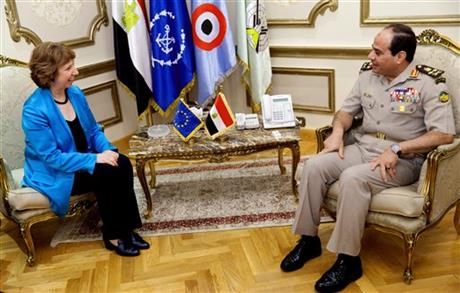
By SARAH EL DEEB
In this image released by the Delegation of European Union in Egypt, Egyptian Minister of Defense, Abdel-Fattah el-Sissi, right, meets with High Representative of the European Union, Catherine Ashton in Cairo, Egypt, Thursday, Oct. 3, 2013. (AP Photo/Pedro Costa Gomes, Delegation of European Union in Egypt)
CAIRO (AP) — Egypt’s Muslim Brotherhood on Thursday sharply criticized the military for ousting the country’s Islamist president, comparing its rule to that of Adolf Hitler, Roman emperor Nero or Mongol conqueror Hulagu Khan — remarks likely to stoke tensions ahead of rival rallies by supporters and opponents of the former leader.
The language was particularly sharp even compared to other recent Brotherhood tirades, and is certain to further sour chances of political reconciliation with Egypt’s interim authorities, at least in the foreseeable future. The group has delivered a flurry of anti-military pronouncements in the three months since Mohammed Morsi, Egypt’s first freely elected president, was toppled in a popularly-backed military coup.
Since Morsi’s July 3 ouster, the country’s military-backed government has moved against the Brotherhood, banning the group, seizing its assets and arresting hundreds of its members and supporters.
The rival rallies on Sunday — both are planned for Cairo’s central Tahrir Square — carry the potential for violent clashes between Morsi’s Islamist supporters and Egyptians who back the military.
The date is also a national holiday, marking the 40th anniversary of the start of the 1973 Middle East war in which Egyptian forces made initial gains against Israel. Most Egyptians revere the memory of that war as one of victory, a sentiment that leaves the Brotherhood in a negative light on account of its call for anti-military rallies on its anniversary.
The statement also vilified the regime of Egypt’s charismatic leader Gamal Abdel-Nasser, again clashing with popular sentiment that the late leader was a champion of the poor and a nationalist who held the country together. Abdel-Nasser cracked down on the Brotherhood in the 1950s and 1960s, jailing hundreds of its members and executing several of its leaders.
Underlining that sentiment, Interim President Adly Mansour on Thursday posthumously decorated Mohammed Fawzi, a wartime defense minister who served under Abdel-Nasser.
“If history will mention the 1973 (military) commanders on its brightest pages, there is no doubt that it will mention the leaders of the bloody coup who murdered their Egyptian brothers on the same page with Nero, Hulagu and Hitler,” the Brotherhood statement said.
The statement also urged Egyptian troops to rebel against their commanders and said it hoped that Sunday will mark a “victory by the people over those who the staged a coup against them for personal gain.” It said the deployment of troops and armor across much of the nation provided proof that those behind the coup “felt weak and lacking in legitimacy.”
An umbrella of Islamist groups led by the Brotherhood issued a separate statement with similar calls for soldiers to mutiny against their commanders, saying the military must end its involvement in Egyptian politics and focus on the defense of the country instead.
The National Alliance for Supporting Legitimacy also urged opponents of the coup to gather at squares across the nation on Friday and on Sunday in Tahrir Square. The sprawling plaza, birthplace of the 2011 uprising that toppled autocrat Hosni Mubarak, has since been the venue of choice for liberal and left leaning pro-democracy groups, which makes the Brotherhood’s plan to hold its rally there a recipe for clashes with the other camp as well as security forces.
Since his ouster, Morsi has been detained by the military in an undisclosed location while the military-backed authorities cracked down on the Brotherhood, rounding up more than 2,000 of its members and activists, including spiritual leader, Mohammed Badie, and his powerful deputy, Khairat el-Shater. Many of those detained are facing charges that range from conspiring with foreign powers and incitement of violence to corruption and murder.
Morsi supporters have in the meantime staged daily protest across much of Egypt, but the numbers taking part in these marches has steadily dwindled in recent weeks.
Also Thursday, The European Union’s foreign policy chief, Catherine Ashton, held talks with officials in Cairo, meeting Mansour, the interim president, and the military chief, Gen. Abdel-Fattah el-Sissi, in what was her third visit to Egypt in as many months.
Her meeting with el-Sissi lasted more than two hours and touched on Egypt’s democratic process, the economy as well as conditions in the Sinai Peninsula, a strategic region bordering Gaza and Israel and where Islamic militants, some with al-Qaida links, are targeting police and army troops on a daily basis.
“I got a real sense of everyone really trying to go forward in the right way,” she said of her talks in Cairo, which included meetings with the nation’s top Muslim and Christian clerics as well as the head of a 50-member panel amending an Islamist-tilted constitution adopted when Morsi was in power. She also said that political reconciliation in Egypt would take a long time.
Sunday’s planned protests and fears of renewed violence highlight the turmoil that continues to engulf Egypt and which threatens to derail or delay the military-backed road map announced on the day of Morsi’s ouster. The plan calls for presidential elections early next year.
Clashes on Wednesday between Morsi’s supporters and opponents in the Red Sea city of Suez, a bastion of dissent since 2011, left a 16-year-old boy dead, according to Reda Zaghloul, emergency chief at the city’s main hospital. At least 10 others were injured.
___
Associated Press writer Hamza Hendawi contributed to this report.


